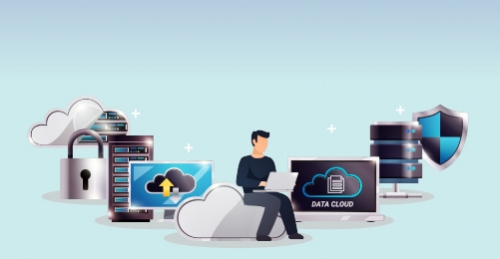The amount of data produced and exchanged by users on the internet each second is unbelievable, and that’s for regular users like you and me, but what about companies and large businesses?
Where do they go with all the data they have? And how do they process, manage, and protect their data?
Thankfully, the IT world has long been offering two powerful, professionally engineered solutions to address this challenge: “Data Centers” and “Cloud Computing”, and sometimes it’s easy to get these terms mixed up although there are a number of differences that set each of them apart and help businesses and organizations alike choose which one is better or more suitable to them.
So, before diving into the main differences, let us define each one of them in simple words:
What’s a Data Center?
A data center refers to an on-premise server hardware built to store, process and access data through a local network. It’s usually maintained by a company’s IT department, that’s responsible for its maintenance, accessibility, physical security, and uptime.
What is Cloud Computing?
Cloud computing on the other hand, is not a physical setup, and it wouldn’t exist without the aid of the internet.
In a nutshell, cloud computing is a general term for anything that involves delivering hosted services over the internet, which include tools and applications like data storage, databases, and software.
Cloud computing does not require installing any physical infrastructure to a company’s on-premises. Instead, it comes in the form of a purchase of critical services, such as storage, compute, networking and software tools – all delivered via an internet connection. To help remove the burden of downtime, eliminate the need for an experienced IT team and slash all maintenance costs, these subscription-based cloud services are all maintained and secured by a third-party that’s responsible for keeping the hardware in physically safe locations while ensuring everything’s up and running 24/7/365.
Cloud Computing VS Data Centers
Any business owner has to keep the safety and availability of their critical company data top of mind; therefore, if you're deciding between using cloud service and building your own data center, here are the main factors that help you make the right choice for your business.
Customizability & Scalability
If your company needs a dedicated system that offers full control over data and hardware, then a data center is the ideal choice. Since only the company is using the hardware infrastructure, a data center is more suitable for an organization that has to run many types of applications and complex workloads.
But the downfall is that the data center has limited capacity! If your company is looking to expand the storage and workload, then it’s going to be fully responsible for purchasing and installing the up-to-date equipment required.
On the other hand, cloud data systems have potentially unlimited capacity depending on what your vendors offer. The single disadvantage here is that you don’t have full control over the hardware since they are remotely located and managed by the vendors. Not to mention that, unless you pay to have a private cloud within the vendor’s own network, then you will be sharing the hardware resources with other users. Security
Well, the understatement of the century is that data security is what makes a company reliable and trustworthy these days.
With cloud computing, your company will be trusting the service provider or vendor with all the data it has and it’s up to the provider to ensure that it has updated security services and certifications. Not to mention that the cloud might reside on several data centers, where it needs security measures in each location.
Here, we can give this point to the data center. Because it is connected directly to your company’s local network and that makes it easier to ensure that only people with approved credentials and devices can access stored applications and information.
Cost
Well, the cost of data storage varies for different business setups. For a small business, the logical choice is cloud computing since it’s an affordable option.
But if your company decided to build a data center from the ground up, in addition to the time it will need, your company will be responsible for the system's maintenance and administration.
As for the cost range, operating a large data center can cost a company between $10 million to $25 million per year!
Management
Where While the data centers are managed by a company’s IT department professionals, no third party is involved in the cloud, and the user is responsible to manage corporate data online.
Accessibility
When using a data center, accessing the stored data is not really direct and easy. Here you have to undergo a process of security checks and verification; whereas, with cloud computing, data is easily accessible online by the user at any hour of the day, on any device.
Deciding between On-Premise and Cloud
We have to admit, the decision between the cloud and the data center is an overwhelming process.
Generally speaking, if you have a small business, it can be quite suitable to go for the cloud as it requires less time to manage besides being cost-efficient.
However, for a large company that is more extensive and widespread, it’s better to go for an on-premise data center.
Those are not the final words, because we recommend an extensive analysis of your entire business needs to determine what matters most to your company.
After all, there’s always the option of consulting a professional, just
contact us and we will be more than happy to help you choose what best suits your unique business needs.
Ctelecoms Team



